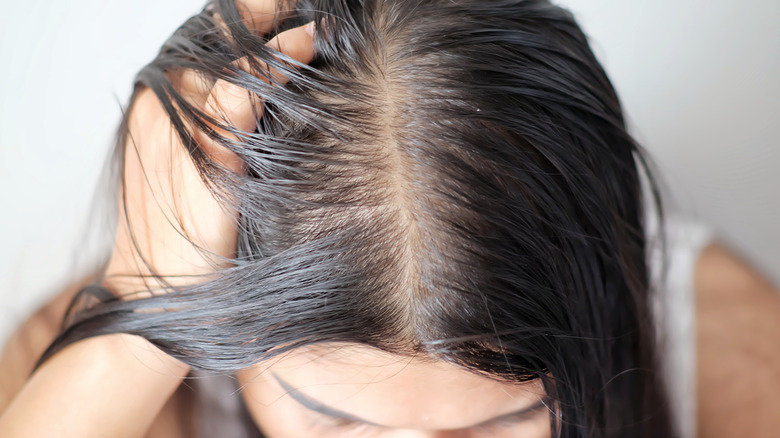What It Really Means When Your Hair Stops Growing
Our hair is special to us and is an essential part of our grooming. The amount of money we spend on our hair proves just how much we care about it, with hair care products generating billions of dollars every year in the U.S. alone (via Statistica).
But what happens when your hair stops growing? What could it possibly mean? While it might be tempting to go out and spend a fortune on expensive products that promise thick and healthy hair, it is essential to know the reason behind the stop in hair growth. Knowing the cause will help you plan out a practical approach to resuming your hair growth.
Finding the reason behind why your hair has stopped growing starts with knowing more about the hair cycle. Our hair's growth cycle has three phases — the anagen, catagen, and telogen phases (via WebMD). What's even more interesting is that not all hair follicles go through the same phase at the same time. One study showed that in healthy hair cycles, the majority of follicles found growing are in the anagen phase (via Clinical, Cosmetic and Investigational Dermatology).
The anagen phase lasts two to eight years, while the catagen phase — where hair stops growing but doesn't shed — may last between four to six weeks. Hair is in the telogen phase when it begins falling out. This phase usually lasts between two to three months (via Healthline).
Genetics, thyroid disorders, and stress all impact hair growth
Growth cycle aside, there are other reasons as to why your hair may have stopped growing, and one of them happens to be the genes you inherit. Genetics can play a crucial role in hair growth for both women and men, including pattern baldness: female pattern baldness (FPB) in women and male pattern baldness (MPB) in men (via Healthline). Age can be a vital factor too. As much as two thirds of American men experience hair loss as early as age 35 (via American Hair Loss Association).
While patterned thinning and coming of age might explain a stop in hair growth, another factor that comes into play is a thyroid disorder. Both an underactive thyroid, as well as an overactive thyroid, can affect the production of thyroid hormones and result in hair loss (via British Thyroid Foundation). Another factor that might contribute to a stop in hair growth is stress. Stress can manifest itself in physical ways such as impulsive hair pulling, or even a lowered immune system, both of which can impact hair's ability to grow (via Mayo Clinic).
If you are experiencing a stop in hair growth, it is best to consult with a specialist who can help identify the cause behind it and develop an effective treatment plan.


